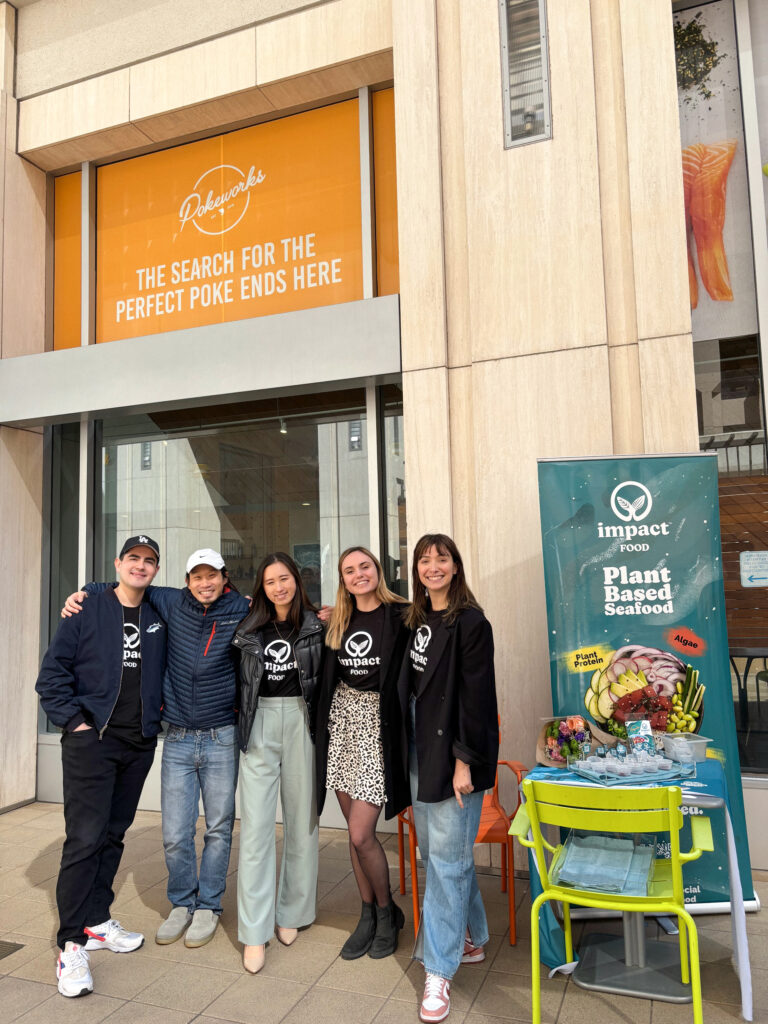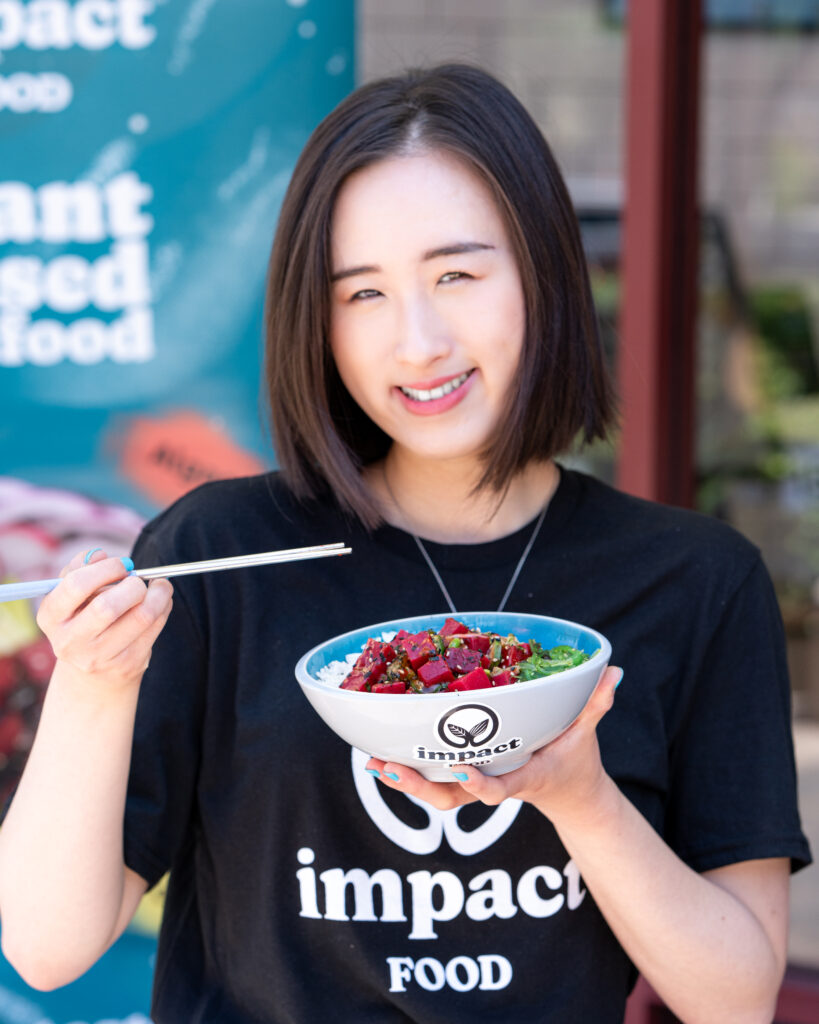Impact Food Launches in Cal Dining: a Q&A with Founder Kelly Pan
Impact Food, a startup bridging food innovation and sustainability, specializes in creating cost-effective, nutritional, and tasty alternative seafood. Founded in the Alt Meat Lab course offered by SCET, Impact Foods is the recipient of the Hult Prize as well as the People’s Choice in the Collider Cup in 2020. We followed up with co-founder Kelly Pan to learn more about the company’s journey and mission, as well as the recent Impact Food launch in Cal Dining.
What inspired Impact Food, and how has the Alt Meat Lab course helped to bring your product to life?
Impact Food was inspired by the urgent need for sustainable, nutritious, and delicious alternatives to traditional animal-based meat, driven by concerns over environmental impact, animal welfare, and health. The Alt Meat Lab played an instrumental role in bringing our first product to life by providing a collaborative and innovative environment to explore the science and technology behind alternative proteins. The supportive ecosystem of diverse students, expert mentors, and a network of industry professionals encouraged experimentation and creative problem-solving to turn our class science project into an entrepreneurial venture.
What has been most rewarding about your journey as an entrepreneur?
The most rewarding aspect of my journey as an entrepreneur has been seeing the tangible impact of our innovations on both the environment and people’s lives. Watching our team grow and build together through both our wins and challenges has been incredibly fulfilling, as has receiving positive feedback from customers who appreciate the quality and sustainability of our offerings. The opportunity to contribute to a healthier planet while building a successful business with passionate, impact-driven individuals is immensely gratifying.

What is the vision and mission of your company, and what impact do you hope your product will have on the environment and food industry as a whole?
The vision of Impact Food is to empower people to eat food that is better for them and the planet. Our mission is to build a more sustainable and resilient food system through delicious, nutritious next-generation seafood. We hope our products will significantly reduce carbon emissions, alleviate pressure on our oceans, and decrease reliance on fisheries for food. By doing so, we strive to transform the food industry, making sustainable choices more accessible and appealing to consumers worldwide. We’re working to reduce the environmental footprint of food production while promoting health and well-being through innovative, high-quality food.
Do you have any advice for future entrepreneurs at Berkeley hoping to make a similar impact?
Stay passionate and resilient in pursuing your vision. Leverage the Berkeley network and resources available, such as courses, labs, and mentorship programs, to refine your ideas and gain valuable insights. Don’t be afraid to take risks and learn from failures, as these experiences will help you grow and strengthen your business. Embrace collaboration, be open to feedback, and ask for help when needed. Most importantly, stay committed to your mission, as the journey may be challenging, but the rewards of making a meaningful impact are well worth it.
What role do you think alternative meat products will play in the future of sustainable food systems?
Alternative meat products will play a critical role in the future of sustainable food systems by significantly reducing the environmental impact of food production. They offer a way to lower greenhouse gas emissions, decrease land and water usage, and reduce the strain on natural resources compared to industrial fishing and factory farming. Alternative meats also help address food security by providing a scalable and efficient protein source without compromising on taste or health. As technology and consumer acceptance continue to grow, these products will become an integral part of a more sustainable and resilient global food system.
What is the impact you hope to see with Impact Food’s launch in Cal Dining?
With the new launch in Cal Dining, we hope to see a positive impact by providing students with sustainable and nutritious protein options that align with their values. We aim to reduce the carbon footprint associated with campus dining while offering delicious and satisfying alternatives to conventional animal meat. We hope to raise awareness about the benefits of alternative proteins and encourage a shift towards more sustainable eating habits among the campus community. Ultimately, we aspire to set a precedent for other institutions and communities to adopt similar practices, contributing to a broader movement towards sustainable food systems.

Impact Food, a startup bridging food innovation and sustainability, specializes in creating cost-effective, nutritional, and tasty alternative seafood. Founded in the Alt Meat Lab course offered by SCET, Impact Foods is the recipient of the Hult Prize as well as the People’s Choice in the Collider Cup in 2020. We followed up with co-founder Kelly Pan to learn more about the company’s journey and mission, as well as the recent Impact Food launch in Cal Dining.
What inspired Impact Food, and how has the Alt Meat Lab course helped to bring your product to life?
Impact Food was inspired by the urgent need for sustainable, nutritious, and delicious alternatives to traditional animal-based meat, driven by concerns over environmental impact, animal welfare, and health. The Alt Meat Lab played an instrumental role in bringing our first product to life by providing a collaborative and innovative environment to explore the science and technology behind alternative proteins. The supportive ecosystem of diverse students, expert mentors, and a network of industry professionals encouraged experimentation and creative problem-solving to turn our class science project into an entrepreneurial venture.
What has been most rewarding about your journey as an entrepreneur?
The most rewarding aspect of my journey as an entrepreneur has been seeing the tangible impact of our innovations on both the environment and people’s lives. Watching our team grow and build together through both our wins and challenges has been incredibly fulfilling, as has receiving positive feedback from customers who appreciate the quality and sustainability of our offerings. The opportunity to contribute to a healthier planet while building a successful business with passionate, impact-driven individuals is immensely gratifying.

What is the vision and mission of your company, and what impact do you hope your product will have on the environment and food industry as a whole?
The vision of Impact Food is to empower people to eat food that is better for them and the planet. Our mission is to build a more sustainable and resilient food system through delicious, nutritious next-generation seafood. We hope our products will significantly reduce carbon emissions, alleviate pressure on our oceans, and decrease reliance on fisheries for food. By doing so, we strive to transform the food industry, making sustainable choices more accessible and appealing to consumers worldwide. We’re working to reduce the environmental footprint of food production while promoting health and well-being through innovative, high-quality food.
Do you have any advice for future entrepreneurs at Berkeley hoping to make a similar impact?
Stay passionate and resilient in pursuing your vision. Leverage the Berkeley network and resources available, such as courses, labs, and mentorship programs, to refine your ideas and gain valuable insights. Don’t be afraid to take risks and learn from failures, as these experiences will help you grow and strengthen your business. Embrace collaboration, be open to feedback, and ask for help when needed. Most importantly, stay committed to your mission, as the journey may be challenging, but the rewards of making a meaningful impact are well worth it.
What role do you think alternative meat products will play in the future of sustainable food systems?
Alternative meat products will play a critical role in the future of sustainable food systems by significantly reducing the environmental impact of food production. They offer a way to lower greenhouse gas emissions, decrease land and water usage, and reduce the strain on natural resources compared to industrial fishing and factory farming. Alternative meats also help address food security by providing a scalable and efficient protein source without compromising on taste or health. As technology and consumer acceptance continue to grow, these products will become an integral part of a more sustainable and resilient global food system.
What is the impact you hope to see with Impact Food’s launch in Cal Dining?
With the new launch in Cal Dining, we hope to see a positive impact by providing students with sustainable and nutritious protein options that align with their values. We aim to reduce the carbon footprint associated with campus dining while offering delicious and satisfying alternatives to conventional animal meat. We hope to raise awareness about the benefits of alternative proteins and encourage a shift towards more sustainable eating habits among the campus community. Ultimately, we aspire to set a precedent for other institutions and communities to adopt similar practices, contributing to a broader movement towards sustainable food systems.



